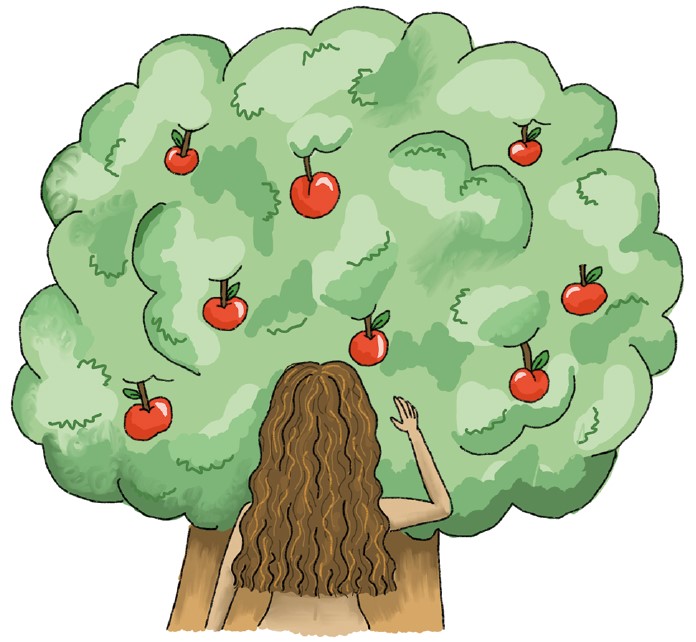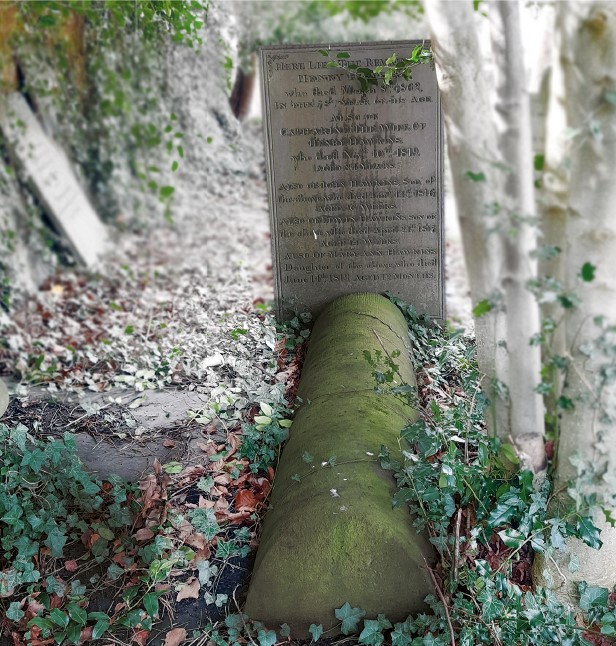THE FRUIT HUNG LOW on the branch, and it seemed to dance in the sunlight. It cried out to be eaten—smooth, luscious and ripe. The woman compared it with a peach, or a melon, or any other fruit that she had eaten, and she knew at once it was better than any of them. Then the mocking words of the serpent began to race round and round in her head: ‘You will not surely die’ (Genesis 3:4).
She had not thought about it before—that the Lord God might not really mean what He said. The angels certainly knew good and evil, those wonderful beings with whom she and Adam were sometimes allowed to converse, and yet they were not dead. To be like them, so superior in every way, so gracious and intelligent and wise, and all for the eating of this fruit! Her heart pounded, and she felt dizzy with a strange blend of excitement and fear. In that moment the warmth and beauty and soft rustling of the garden faded, and her whole world converged on this enticing tree. She took a step closer. The sweet smell of the fruit ran down her palate, her mouth began to water, and she felt very hungry. Suddenly something snapped inside her. Shaking with tension, she reached out and pulled it from the tree.
When the woman saw that the tree was good for food, and that it was a delight to the eyes, and that the tree was to be desired to make one wise, she took of its fruit and ate, and she also gave some to her husband who was with her, and he ate (Genesis 3:6).
The record continues, ‘Then the eyes of both were opened’ (v. 7). To this extent the serpent was right. Now Adam and his wife had passed from innocence to guilt; nothing could be the same. ‘Knowing good and evil’ (v. 5) is a Bible expression that applies to us all as we grow up. It is used in Deuteronomy 1:39 to divide children from adults.
The awakening of conscience happens gradually to us. In the case of Adam and Eve it seems to have happened in a flash. They had challenged God by eating from the forbidden tree, and now they were afraid and hid themselves from His sight.
The First Sin
The fall of our first parents carries deep lessons. It introduces us to the phenomenon of sin. Adam and Eve had the same basic drives as the rest of us, in whom hunger and curiosity and pride are strong. In their world of delight, they could indulge their fancy, and do just what they liked without fear of upsetting anybody, with one exception. There was one line laid down, over which they must not cross. ‘Of the tree of the knowledge of good and evil you shall not eat,’ God had said, ‘for in the day that you eat of it you shall surely die’ (Genesis 2:17). That line was the very first law. It put a curb on their hunger, curiosity and pride. This is true of any law.
Our parents lay down the first rules we faced—“you must never write on the wallpaper”, “be back by 10 o’clock”— this sort of thing. When we grow up, we become responsible to the law of the country in which we live. This places many restrictions on our activities. It prevents us driving as fast as we like in a built-up area, or building a house in a beauty spot, because the lawmakers have decided it would not be for the common good.
Now, if we read the Bible, we cannot dodge the fact that God, too, has laid down His rules to control our lives. When we break God’s rules, the Bible calls that sin. ‘Everyone who makes a practice of sinning also practises lawlessness; sin is lawlessness’ writes the Apostle John (1 John 3:4). Even though people persuade themselves they can reject the right of God as Creator to intrude into their lives, this does not lessen their guilt, just as the criminal who challenges the right of the court to try him is still condemned.
The unfortunate thing is that even when we do believe in God and want to keep His laws, we still find ourselves guilty of breaking them every day. However we try, we find ourselves forgetting or failing to obey God all the time. Even Paul, the great apostle, had to admit: ‘I do not do the good I want, but the evil I do not want is what I keep on doing’ (Romans 7:19).
The inescapable conclusion is that whether we are Christians or Communists, believers or agnostics, in practice we are all guilty of sin. We stand bracketed with Adam and Eve, awaiting the decision of God.
But what will God say? To break the rules implies a risk of punishment. Adam had been told ‘in the day that you eat of it you shall surely die’ (Genesis 2:17). Did God mean what He said? Or was the serpent right? What does God do about sinners, wilful or otherwise? We must consider the answer carefully, because the outcome affects us all.
Human Nature
We can all remember waiting for Mum or Dad to come home when we had been naughty. There was the gnawing fear of punishment—no going out to play, or being denied some treat. There was also another, deeper dread. We knew that what we had done would upset them. We had imperilled that precious bond of understanding and affection that links us to our parents and gives us security and peace of mind. They would send us away, out of the room, and we would be cut off. So, the moment they discovered our mischief, we would try to soften the blow. “It wasn’t my fault”, we would say, clutching at any excuse to remove the sternness from that penetrating gaze.
Human nature does not change. Adam and his wife had broken God’s only rule, and they hid to avoid being found out. Eating from the forbidden tree had not brought the benefits the serpent had promised. Far from feeling like the angels of God, they could not face them, and waited in an agony of apprehension to see what was to happen to them. Typically, when each was accused, they tried to shift the blame:
He said, “Who told you that you were naked? Have you eaten of the tree of which I commanded you not to eat?” The man said, “The woman whom you gave to be with me, she gave me fruit of the tree, and I ate.” Then the Lord God said to the woman, “What is this that you have done?” The woman said, “The serpent deceived me, and I ate” (Genesis 3:11–13).
Trembling and silent, they awaited the decision of the Judge of all the earth.
The measured words of the Creator in that hour have shaped the destiny of every person that ever lived. First, He cursed the serpent for urging Eve to disobey. Then He condemned the two sinners to a life marred with sorrow. To the woman: ‘I will surely multiply your pain in childbearing; in pain you shall bring forth children. Your desire shall be for your husband, and he shall rule over you.’ And to the man: ‘Cursed is the ground because of you; in pain you shall eat of it all the days of your life; thorns and thistles it shall bring forth for you; and you shall eat the plants of the field. By the sweat of your face you shall eat bread, till you return to the ground’ (vs. 16–19).
Consequences
Finally, He thrust them out, shutting them off from their birthplace of happiness and fellowship with the angels, to till the ground in a harsh and inhospitable world.
What are we to make of the judgment of the Lord? We must admit it fits the facts. Though life has many joys, and there are few that have no happy memories at all, the clouds of sorrow are never far away. The pain of childbearing goes beyond the ordeal of the birth to compass the sadness of watching children grow up and fly away from the nest. The worry and effort of bread-winning weighs heavily. Disease and accident cause an endless rain of tears. Then there is the greed and brutality of people themselves that lead to war and crime. Above all looms the grim inevitability of death, which snatches our loved ones from our arms and awaits each one of us. ‘Man is born to trouble as the sparks fly upwards’ (Job 5:7).
Justice
Was God right to punish people so? The sentence may seem to us to strike harshly. But God had made plain what would be the penalty for breaking His law. To overlook the offence would have been morally wrong, and God is Himself the very standard of justice. We know from experience that when rules are broken with impunity, misconduct spreads and the rule maker is soon despised.
Think of the emergency brake handle in a railway carriage. Our safety depends on the knowledge that the notice next to it means what it says—if we pull the handle without good cause we shall have to pay a stiff fine. If the rail operator did not bother to bring to court those who used the handle improperly, or if the courts just waived the fine, people would be stopping trains for any excuse. The service would be disrupted and accidents would proliferate.
Adam, then, must learn that God was not to be mocked. He had been warned, in the graphic terms of the Hebrew original, ‘in the day you eat of it, dying you will die’ (Genesis 2:17). The penalty was exacted forthwith. An irreversible change took place inside Adam and his wife. Their lives, and those of their offspring, were thenceforward programmed to a pattern of growth in youth, stability through their middle years, and an inevitable decline in old age.
But God, in His mercy, did not leave it at that. He immediately set about the process of undoing the evil that our first parents had done.
David Pearce
(to be continued)





